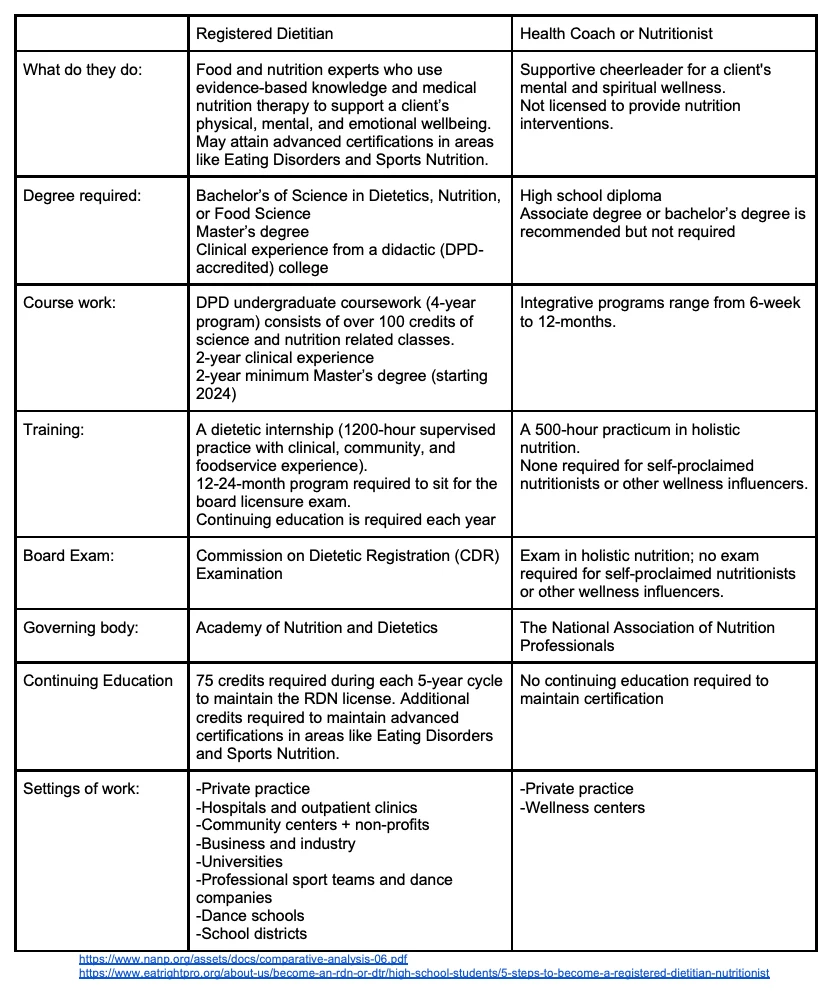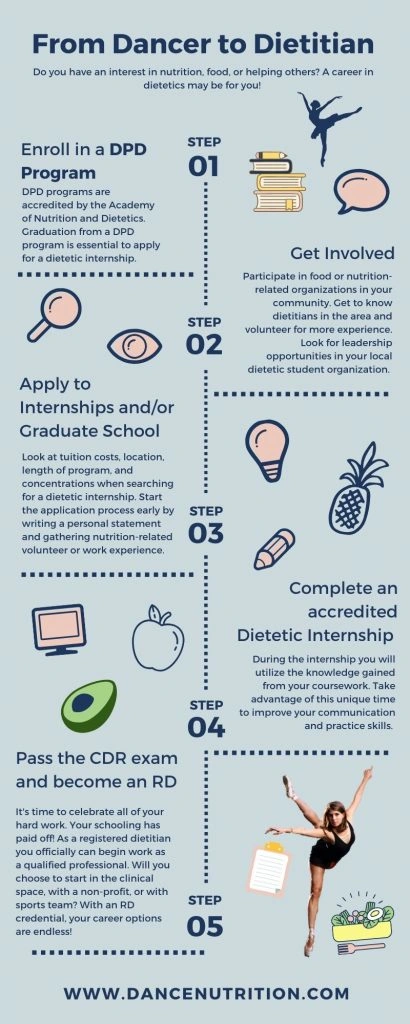From Dancer to Dietitian – The Roadmap
Are you a dancer with an interest in nutrition, food, or helping others? Many dancers inquire about the road to becoming an expert in nutrition for dancers. This article will share tips for you to consider if interested in blending your passions for dance and wellness.
Why nutrition for dancers?
Dancers are artistic athletes. This unique combination requires nutrition education to not only maximize strength and enhance endurance, but also, to sustain a balanced lifestyle without the risk of burnout. For this reason, dancers should seek qualified information. But it can be challenging to decipher nutrition information that is qualified from information that is not.
What is a Registered Dietitian Nutritionist?
A Registered Dietitian Nutritionist is a board-certified individual who is considered an authority for food and nutrition guidance. Depending on the location, the following titles refer to a professional in the field of nutrition and dietetics:
Registered Dietitian Nutritionist (RDN)
Registered Dietitian (RD)
Licensed Dietitian Nutritionist (LDN)
Licensed Dietitian (RD)
There is a distinctive difference between a dietitian and other nutrition professionals, including but not limited to titles like:
Nutritionist
Food therapist
Nutrition expert
Health coach
Nutrition coach
Unlike the title dietitian, the titles above are not regulated. This means that any person, regardless of their education and experience, can use them. The RD/LD or RDN/LDN credential is obtained through rigorous training (more on this below)— involving years of academic and clinical work, supervised practice, and continuing education. The path to licensure separates dietitians from other self-proclaimed nutrition professionals and enables dietitians to practice legally in a variety of settings.
Is there a difference between dietitians and health coaches?
Yes, there are many differences. Dietitians must complete rigorous training to both attain and maintain their license to practice. Registered Dietitians are also board-certified practitioners, meaning they must exemplify advanced proficiency in the various specialties in which they practice. There are also similarities between dietitians and health coaches, mainly in regard to their desire to support others. Here is a chart to further break down the differences and similarities between these two titles:

A certified nutrition specialist (CNS) is another popular credential that you may see individuals have behind their names. Certified nutrition specialists are typically health professionals that started out in another area within the medical field such as a physician or an advanced practice nurse. A master’s or doctoral degree is needed by those who wish to pursue this certification. Registered dietitians with a graduate degree may choose to obtain this credential as well, but it is not necessary for practice.
*In certain countries the term “nutritionist” is credible and used for those performing the same roles as a Registered Dietitian. It is always helpful to look into the governing body of food and nutrition in your country to determine the proper path of study!
Why attain the RD license?
Dietitians have the freedom to work in a plethora of settings whether it be in a hospital providing medical nutrition therapy or focusing in a more intimate setting such as in private practice and/or working with professional dance companies and dance schools. Dietitians can also serve as voices in the media— debunking popular myths and pseudoscience. Nutrition services provided by licensed dietitians are also more likely to be covered by insurance, allowing for more accessible treatment.
RDNs in dance schools and companies
Registered dietitian nutritionists are not only beneficial at the individual level (more on this here) but also, play a vital role at the institutional level. Dietitians can administer nutrition-related policies and assist schools and companies with carrying out nutrition-support protocols like workshops, snack breaks, and food/hydration tables.
Dietitians are also trained to assist in the screening and assessment of various risk factors like eating disorders, nutrient deficiencies (i.e., iron and B12), and Relative Energy Deficiency in Sport. Dietitians can provide referral services for dancers who might be physically injured, along with being the front line in identifying dancers who may benefit from working with a mental health practitioner.
Building an evidence-based practice
A dietetics degree includes years of schooling and a substantial amount of science-based courses. These are the framework of any collegiate dietetics/nutrition program. While some may hesitate to pursue such a science-focused path, realize that your interest in nutrition requires a deep understanding of the body and how it functions both physically and mentally. When you’re able to connect the principles of biochemistry and anatomy to how a dancer nourishes their body, the otherwise intimidating coursework becomes exciting and bearable.
Typical coursework includes:
Biochemistry
Microbiology
Psychology
Statistics
Anatomy and Physiology
Marketing
Food Science
Lifecycle Nutrition
Medical Nutrition Therapy
Nutrition Counseling
Public Health / Community Nutrition
Food Systems Management
Nutrition Genomics
Practicum in Dietetics
Why attend a college with a Didactic Program in Dietetics (DPD)?
The Academy of Nutrition and Dietetics, which oversees the profession, creates educational standards for all dietetic professionals. This ensures that all dietetic professionals practice under the same code of ethics. It also ensures that all dietetic students nationwide are learning the same principles and receiving the same quality of education necessary to succeed in the professional world.
If you’re looking to pursue the path to an RD license, then you’ll need to apply to a college that specifically has an accredited Didactic Program in Dietetics (DPD). The Academy has a search engine that makes finding schools with DPD accreditation simple.
DICAS and the dietetic internship
Upon completing your collegiate-level coursework in nutrition, you’ll then become familiar with DICAS, the Dietetic Internship Centralized Application Service. This is the application required to pursue a Dietetic Internship. The Dietetic Internship is a year-long supervised experience required in order to sit for your state’s board certification exam.
Choosing a dietetic internship
The Dietetic Internship is often the bridge between your academic studies and your professional career. This experience allows you to become familiar with a variety of settings, including but not limited to hospitals, outpatient clinics, food service management, research facilities, and schools.
Realize that not all internships are the same. While any internship can prepare you with experience in clinical nutrition, food service management, and community nutrition, some have a more specialized curriculum. Therefore, it’s important to consider the following factors before applying to your dietetic internship of choice:
Are you interested in a more specialized area of focus like with dancers? If so, look for a program that offers flexibility in creating your own personalized project or “specialty rotation.” For example, opportunities may exist for you to shadow a private practice dietitian for an entrepreneurial experience. Keep in mind that these programs may require more legwork as dietetic interns are expected to locate dietitians to shadow.
Consider the cost. Most intern positions are unpaid and may incur financial stipulates like daily transportation fees. To help, look for in-state programs or schools that offer tuition waivers such as the ability to hold the position of a Teacher’s Assistant.
Does your internship include coursework toward a Master’s Degree? Beginning in 2024, a Master’s degree (in any subject) will be required in order to register for the CDR dietetic board exam. You can attain a Master’s degree in any subject from Nutrition to Psychology, Business, etc.
Can I dance in college while studying dietetics?
No matter which DPD school you choose to attend, coursework in dietetics is rigorous. Nothing is impossible, but balancing multiple areas of interest will require exceptional time management skills and dedication.
Throughout your schooling, dietetics is likely to be your prime focus. However, staying engaged in activities outside the wellness sector is great for both your well-being and your resume. If you can manage to keep up your grades while participating in volunteer or work experiences and continuing your passion for dance then go for it! Rachel danced part-time throughout her studies and was able to return to dance on a more full-time basis at the completion of her internship. Other dietetic interns are able to work as Resident advisors in the dorms and hold leadership positions in the dietetic student association. The bottom line? It’s all possible!
Continuing education in the evolving field of dance science and medicine
One of the biggest factors setting dietitians apart from other nutrition-related practitioners and coaches is the requirement for continuing education. In order to maintain professional licensure, RDs must complete educational requirements throughout their professional practice. Since nutrition is an evolving science, this continued education ensures that dietitians remain up-to-date on nutrition research, guidelines, and recommendations.
Are there any negatives of licensure?
The cost of licensure is high, both financially and from a time perspective. This unfortunate and problematic reality underscores much of the lack of diversity we see throughout the dietetics profession. The importance of diversity, especially in healthcare settings, is one that needs to be prioritized. Supporting organizations like Diversity Dietetics is highly encouraged to help increase racial and ethnic diversity in the field of nutrition.

Parts of this article were written with the help of Kylie Mignone and expert-reviewed by Rachel Fine.
Rachel Fine is a Registered Dietitian Nutritionist, Certified Specialist in Sports Nutrition, and Certified Counselor of Intuitive Eating. Rachel works with dancers and fitness enthusiasts to optimize performance and rebuild their relationships with food and body.
Like this project
Posted Jan 27, 2024
Article written by Kylie Mignone Serratos. Edited and published by Rachel Fine.
Likes
0
Views
22




